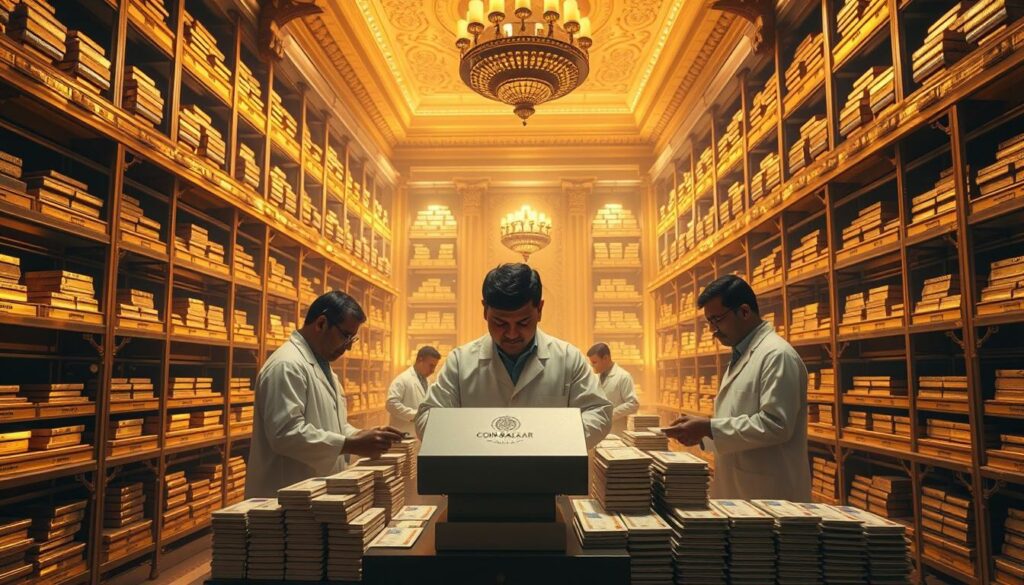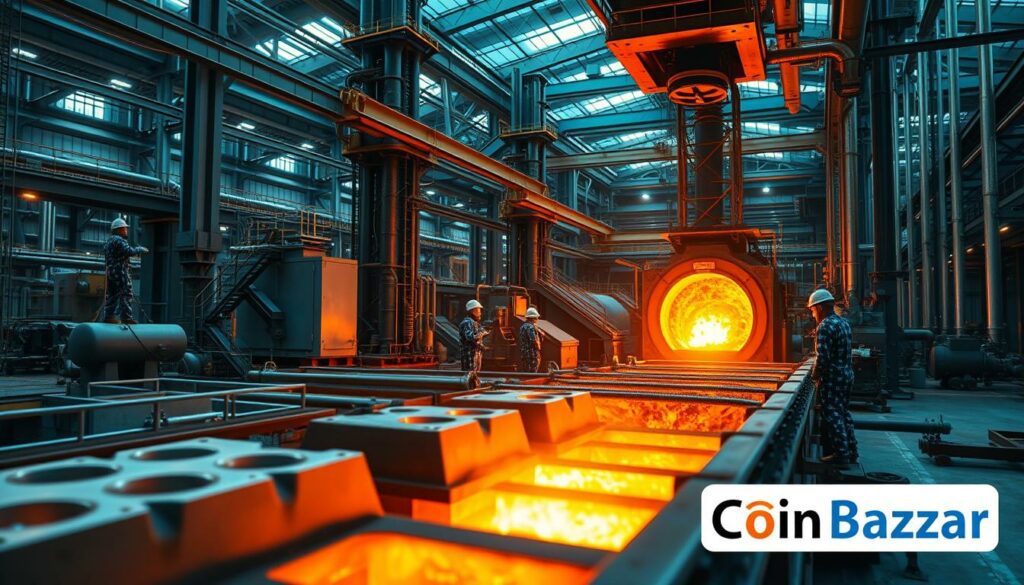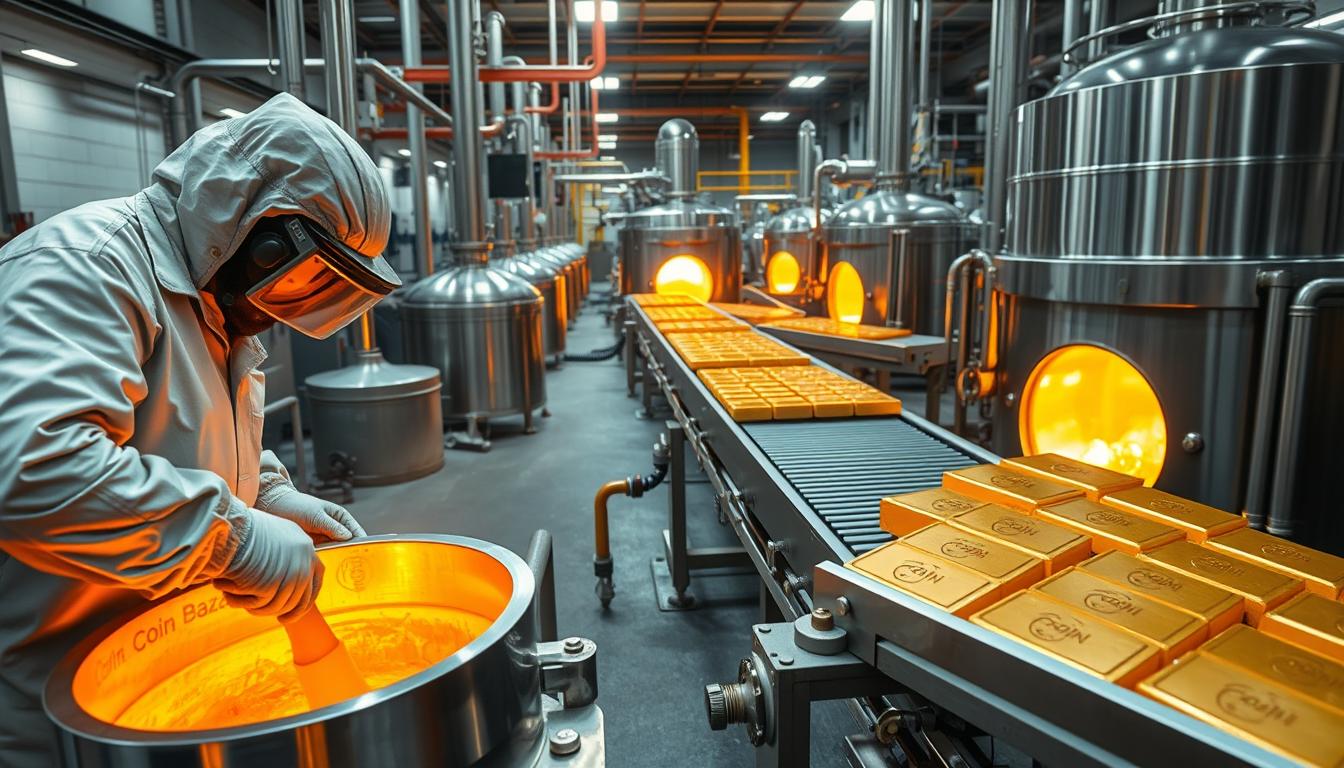When you dive into gold refining in India, you’ll find many myths and misconceptions. These surround bullion refining licenses.
India’s gold refining industry is big, producing 281.3 tonnes of fine gold in 2018. Its growth has made people more curious about the licensing process.
In this article, we’ll clear up the truth from the myths. We’ll give you a clear view of what precious metal refining licenses in India really mean.
Key Takeaways
- Understanding the significance of India’s gold refining industry
- Debunking common myths surrounding bullion refining licenses
- Revealing the realities of the licensing process
- Exploring the importance of precious metal refining in India
- What to expect from the Indian government’s regulations
The Gold Standard: India’s Position in Global Bullion Markets
Gold and precious metals have always fascinated India. They have shaped its economy and culture for thousands of years. This has made India a key player in the global bullion market.
India’s Historical Connection to Precious Metals
Gold has been a part of Indian life since the Indus Valley Civilization. It was used in jewelry and ornaments. Gold’s importance has grown over time, especially in weddings and festivals.
Current Market Size and Growth Trajectory
Today, India is a big consumer of gold. Most of its gold comes from imports. The demand for gold comes from jewelry, investments, and technology.
Domestic Consumption Statistics
India’s gold consumption is high. It makes up a big part of global gold demand. Rising incomes and a growing middle class have boosted gold demand in India.
Export Potential and Challenges
India’s gold refining industry has great export potential. But, it faces tough competition, regulatory hurdles, and market ups and downs.
| Year | Gold Import (Tons) | Gold Refining Capacity (Tons) |
|---|---|---|
| 2020 | 800 | 1000 |
| 2021 | 900 | 1200 |
| 2022 | 1000 | 1500 |
The table shows India’s growing gold imports and refining capacity. This highlights its potential in the global bullion market.


Exploring India’s bullion refining sector is important. Knowing its history and current market is key. The sector is set to grow, thanks to rising demand and government support.
The Science and Art of Bullion Refining
Bullion refining combines advanced science with skilled craftsmanship. It uses chemical and electrolytic methods to get metals to their purest form. This process is both an art and a science, needing precision, expertise, and modern technology.
Technical Processes in Modern Refining
Today’s refining methods aim for top purity and efficiency. Two main techniques are used:
Chemical Refining Methods
Chemical refining uses chemicals to separate metals from impurities. It’s very effective for achieving high purity.
Electrolytic Refining Techniques
Electrolytic refining purifies metals through an electrochemical process. It’s great for metals like gold and silver.


Quality Standards and Purity Measurements
Quality is key in bullion refining. The industry follows strict standards and purity checks.
Fineness and Hallmarking Requirements
Fineness shows a metal’s purity, often in parts per thousand. Hallmarking certifies the purity of precious metal items. Both are vital for trust in the bullion market.
Knowing these technical steps and quality standards shows the complexity of modern bullion refining.
Regulatory Landscape for Precious Metal Refiners
Refining industry leaders in India face many rules to keep precious metal refining top-notch. These rules help keep quality high and protect buyers.
Key Government Bodies and Their Roles
In India, two main groups control precious metal refiners. The Bureau of Indian Standards (BIS) and the Reserve Bank of India (RBI) are key.
Bureau of Indian Standards (BIS)
The BIS sets quality standards for precious metals. It makes sure refiners follow these rules. This keeps the metals pure and of high quality.
Reserve Bank of India (RBI) Guidelines
The RBI oversees the trade of precious metals. It also watches over the money policy for gold and silver.
Recent Policy Developments
Recently, there have been big changes in rules for precious metal refiners. One big area is the Good Delivery Standards.
Impact of Good Delivery Standards
The Good Delivery Standards, from the LBMA, have come to India. They make sure gold and silver bars are up to international standards. This means Indian refiners must meet these high standards to compete globally.
For a refiner, knowing and following these rules is key to success. The rules might seem hard, but staying up-to-date helps you succeed in India’s growing precious metal refining field.
Types of Bullion Refining Licenses in India
In India, companies need specific licenses to work in bullion refining. These licenses follow national and international rules. They make sure the precious metals are of high quality and meet safety and environmental standards.
BIS Certification Process
The Bureau of Indian Standards (BIS) certification is key for bullion refiners in India. It checks if the refining process meets the Indian Standard (IS) 1417 for precious metals.
IS1417 Standards Compliance
IS 1417 standards set the rules for precious metal purity and quality. Refiners must follow these standards to get BIS certification.
Application and Renewal Procedures
To get BIS certification, refiners must apply with the right documents. This includes test reports and details of their production process. The certification is valid for a certain time, after which refiners need to renew it.
NABL Accreditation Requirements
The National Accreditation Board for Testing and Calibration Laboratories (NABL) accreditation is also crucial. It makes sure the refiner’s lab tests meet international standards.
Laboratory Testing Standards
NABL checks if the refiner’s lab tests and equipment are up to standard. This ensures the tests are accurate and reliable.
LBMA Recognition and Its Importance
The London Bullion Market Association (LBMA) recognition is very important. It shows that a refiner’s gold is of the highest quality and purity.
LBMA recognition is vital for refiners who export or trade on international markets. It builds trust and credibility with clients and partners around the world.
In summary, getting the right licenses and certifications is essential for bullion refiners in India. By knowing about BIS certification, NABL accreditation, and LBMA recognition, refiners can follow the rules and stay competitive.
Myth #1: Only Large Corporations Can Obtain Refining Licenses
The refining industry in India is open to all sizes of businesses. It’s not true that only big companies can get refining licenses. India has a system that lets small and medium enterprises (SMEs) join in too.
Reality: Tiered Licensing Structure for Different Scales
India’s rules are made for all kinds of businesses. From small to big, everyone can get a refining license. This helps bring in more diversity and competition.
Case Studies of Successful Small and Medium Enterprises
Many SMEs have made it big in the refining world. For example:
- A small refiner in Maharashtra got a license and grew fast in a year.
- A medium business in Gujarat teamed up with a foreign company to improve its skills.
Financial Requirements by Business Size
The money needed to get a refining license changes with the business size. Here’s what you usually need:
| Business Size | Minimum Capital Investment |
|---|---|
| Small | ₹5 lakhs |
| Medium | ₹50 lakhs |
| Large | ₹5 crores |
Knowing these needs helps you plan your business better. It makes it easier to get through the licensing steps.
Myth #2: The Licensing Process Takes Years to Complete
The idea that getting a bullion refining license takes years is a myth. The time it takes to get a license in India depends on the type of license you want.
Typical Timeline for Different License Types
The time it takes to get a license can vary. It depends on the specific needs and the size of your operation. For example:
- A BIS (Bureau of Indian Standards) certification, important for quality, can be obtained in a few weeks to a couple of months.
- NABL (National Accreditation Board for Testing and Calibration Laboratories) accreditation, needed for lab testing, may take 3 to 6 months.
- LBMA (London Bullion Market Association) recognition, key for global acceptance, can take about 6 to 12 months.
Recent Streamlining of Application Procedures
Recent changes have made the application process for bullion refining licenses much faster. Two main factors have helped:
Digital Application Platforms
Digital platforms have made it easier to apply online. This reduces paperwork and speeds up the process.
Single Window Clearance Systems
Single window clearance systems have combined various approvals into one place. This reduces delays and makes things clearer.
By using these new tools, you can go through the licensing process more quickly. This means you can start your operations sooner.
Myth #3: Foreign Entities Cannot Participate in Indian Bullion Refining
Many think foreign companies can’t join India’s bullion refining. But, India’s economic rules have changed. Now, they welcome foreign investment, even in precious metals refining.
Reality: Current FDI Policies for Precious Metal Refining
India’s FDI rules let foreign companies play a big role in refining precious metals. Up to 100% FDI is allowed automatically for mining and refining. This makes India a great place for global investors.
Joint Venture Opportunities and Regulations
Foreign companies can team up with Indian firms. This way, they can use local knowledge and skills. The rules for joint ventures help both sides work together smoothly.
Success Stories of International Collaborations
Many international partnerships have worked well in India’s bullion refining. For example, MMTC Ltd. teamed up with foreign firms to improve refining. These partnerships bring in money, new tech, and best practices.
These stories show how foreign companies can help and grow with India’s precious metals market.
The Economics of Bullion Refining in India
India is becoming a big player in the global precious metals market. The economics of bullion refining are key to this growth. It takes a lot of money to start a refining business, and the returns can vary. Knowing these economic facts is vital for companies wanting to get into this field.
Capital Investment Requirements
Starting a bullion refining business in India needs a lot of money upfront. This includes:
- Equipment and infrastructure costs
- Human resource requirements
Equipment and Infrastructure Costs
The cost of buying refining equipment, like furnaces and assaying machines, is high. Also, building secure places to store precious metals is expensive. The cost of setting up can change a lot, depending on how big the operation is.
Human Resource Requirements
Having skilled people is crucial for running the equipment and checking the quality. The cost of hiring and training these workers is part of the initial investment. People with experience in metallurgy and refining are especially important.
Return on Investment Analysis
Looking at the return on investment (ROI) for bullion refining involves several things:
- Profit margins from refining services
- Break-even timelines
Profit Margins and Break-even Timelines
Refining can be very profitable, especially if you achieve high purity levels and have efficient processes. How long it takes to break even depends on the initial investment, operational costs, and market conditions. With good management, refining operations can start making money in a few years.
Understanding the economics of bullion refining helps businesses make smart investment choices. The industry is growing, and with the right strategy, investments can pay off big time.
Step-by-Step Guide to Securing Your Bullion Refining License
Getting a bullion refining license takes several steps. You need to prepare, apply, and follow up. Knowing each step helps you apply smoothly and successfully.
Pre-Application Preparation
Before you apply, get your business ready for refining. Focus on two main areas: your facility and your team’s skills.
Infrastructure Requirements
Your facility must have enough space and safety features. It also needs to handle the environment well. This makes the inspection easier after you apply.
Technical Expertise Needed
Your team should know a lot about refining. They need to know about quality control and assaying. Showing you know these things helps your application.
Documentation Checklist
Collecting the right documents is key. Your documents should cover your finances and technical skills. They must be clear and well-organized.
Financial Documents
You’ll need to show your financial health. This includes statements and proof of investment. Make sure these are current and accurate.
Technical Specifications
Provide detailed info about your equipment and process. Include diagrams and quality control details. This shows you follow industry standards.
Post-Application Follow-up Procedures
After you apply, wait and be ready for questions. Keep in touch with the licensing authority. This helps solve any problems quickly.
Prepare well, gather all documents, and stay in touch. This guide helps you through the bullion refining license process. It boosts your chances of success in the application process.
Common Obstacles in the Licensing Journey and Their Solutions
Getting a bullion refining license is tough, but knowing the challenges helps. You’ll face technical, financial, and regulatory hurdles. Understanding these is key to moving forward.
Technical Compliance Challenges
Technical compliance is vital. You’ll deal with equipment calibration and quality control issues.
Equipment Calibration Issues
Calibrating your equipment right is crucial for quality bullion. Invest in top-notch gear and train your team well.
Quality Control Documentation
Keeping quality control records up to date is essential. A good documentation system keeps you ready for checks.
Financial Hurdles
Money problems can block your path to a license. Securing bank support and finding financing is a big challenge.
Banking Support and Financing Options
To beat financial hurdles, look at different funding paths. Build bank relationships and explore these options:
| Financing Option | Description | Benefits |
|---|---|---|
| Bank Loans | Traditional bank loans for equipment purchase and operational costs | Flexible repayment terms, competitive interest rates |
| Investor Funding | Private investors or venture capitalists providing funding in exchange for equity | Access to expertise, potential for large investment amounts |
| Government Grants | Government programs offering grants for specific industries or initiatives | Non-repayable funds, support for innovation and job creation |
Regulatory Navigation Strategies
Understanding regulations is crucial for a license. Stay updated on changes and use industry associations for help.
By tackling common obstacles and finding solutions, you can get your bullion refining license in India more easily.
Environmental Compliance for Bullion Refining Operations
Environmental compliance is key for bullion refining in India. It’s not just about following rules. It’s about doing the right thing for our planet.
Pollution Control Board Requirements
The Pollution Control Boards in India have strict rules for bullion refiners. These rules help reduce harm to the environment. Following these rules is a must to get and keep a refining license.
Air and Water Pollution Standards
Refineries must meet strict air and water pollution standards. They use new technologies to cut down on harmful emissions and waste. For example, scrubbers and electrostatic precipitators help clean the air.
Waste Management Protocols
Good waste management is essential for environmental rules. It means disposing of hazardous waste right, recycling, and keeping the workplace clean. Doing this right not only follows the law but also makes operations better.
Sustainable Refining Practices
Going beyond the rules, sustainable refining can give you an edge. It’s about being efficient with energy and handling chemicals safely.
Energy Efficiency Measures
Using energy-efficient methods saves money and cuts down on carbon emissions. Ideas like heat recovery and renewable energy are very effective.
Chemical Management and Safety
Managing chemicals safely is vital for the environment and worker safety. It means storing chemicals right, wearing protective gear, and training staff. “A good chemical safety plan is key for sustainable refining.”
As
“The future of bullion refining is in sustainable practices that balance making money with caring for the environment.”
Following environmental rules and practices is not just a must. It’s a smart business move for lasting success in the industry.
Tax Framework for Licensed Bullion Refiners
As a licensed bullion refiner, you face many tax issues that can affect your business. It’s key to know the tax rules well to handle India’s tax system.
GST Implications for Precious Metal Refining
The Goods and Services Tax (GST) has made taxes easier for bullion refiners. But, it’s important to know how GST affects your work. GST rates for precious metals can change, and input tax credits can lower your taxes.
Input Tax Credit Considerations
To get the most from input tax credits, follow all GST rules. Keep good records of what you buy and sell. Good records are essential for getting these credits.
Import and Export Duty Structures
Import and export duties are big in the bullion refining world. Knowing these duties helps you make smart business choices. Here’s a quick look at the current duties:
| Duty Type | Rate | Description |
|---|---|---|
| Import Duty | 7.5% | Applicable on precious metal imports |
| Export Duty | 0% | No duty on precious metal exports |
Duty Drawback Schemes
Duty drawback schemes can really help exporters. They let you get back duties on goods you import and then export. This can cut costs and make you more competitive worldwide.
Special Economic Zone Benefits
Working in a Special Economic Zone (SEZ) brings big tax perks. SEZs aim to boost export businesses, making them great for bullion refiners.
By using these tax benefits, you can make your business better and increase profits. As a bullion refiner, knowing the tax rules well is vital for your success.
Technology Requirements for Modern Bullion Refining
In today’s world, technology is essential for bullion refining. It’s not just a tool; it’s a must-have for success. Knowing how technology helps in refining precious metals is vital.
Mandatory Equipment Standards
Modern bullion refining needs advanced equipment for top-notch purity. This includes:
- Assaying and Testing Technology: Accurate assaying is key for checking precious metal purity. X-Ray Fluorescence (XRF) and Fire Assay are used for this.
- Refining Process Automation: Automation boosts efficiency and cuts down on mistakes. It controls temperature, watches chemical reactions, and manages the refining process with great precision.
Emerging Technologies Shaping the Industry
The bullion refining industry is on the verge of a big tech change. New technologies are set to make a big difference.
Blockchain for Supply Chain Transparency
Blockchain tech is being looked at for its ability to improve supply chain transparency. It can track every transaction, ensuring the authenticity and origin of precious metals.
AI and Machine Learning Applications
Artificial Intelligence (AI) and Machine Learning (ML) are being used to better refine processes. They help predict when maintenance is needed and boost efficiency. These techs analyze lots of data to spot patterns and make smart choices.
| Technology | Application | Benefit |
|---|---|---|
| XRF | Assaying | High Accuracy |
| Automation | Refining Process | Increased Efficiency |
| Blockchain | Supply Chain | Enhanced Transparency |
| AI/ML | Process Optimization | Predictive Maintenance |
As the industry grows, using these technologies will be crucial for staying competitive in bullion refining.
Success Stories: Leading Bullion Refining Operations in India
Leading bullion refining operations in India have seen great success. This is thanks to advanced technology and smart business strategies. Their achievements show the industry’s potential and the new ways Indian refiners are tackling challenges.
Profiles of Major Indian Refiners
Major Indian refiners have made big moves in the global bullion market. Companies like MMTC-PAMP and Agrawal Gold & Silver have become leaders. They focus on quality and making customers happy.
Business Models and Growth Strategies
These companies use different business models to grow. For example, MMTC-PAMP has a joint venture. This lets it use global knowledge while serving the Indian market.
| Company | Business Model | Growth Strategy |
|---|---|---|
| MMTC-PAMP | Joint Venture | Global Expertise, Local Market |
| Agrawal Gold & Silver | Private Enterprise | Innovative Refining Techniques |
Emerging Players and Their Innovative Approaches
New players in the Indian bullion refining sector are bringing fresh ideas. They focus on sustainable refining and using the latest technology.
Niche Market Specializations
Some new players specialize in specific areas. They focus on refining for jewelry or making investment-grade bullion. This lets them meet specific customer needs well.
“The future of India’s bullion refining industry looks bright, with both established players and new entrants driving innovation and growth.”
Future Outlook for Bullion Refining Regulations in India
India’s bullion refining industry is set for big changes. These changes come from both inside and outside the country. Knowing about upcoming policies and trends is very important.
Anticipated Policy Developments
Several important policy changes are coming. They aim to improve the rules for bullion refining in India.
Domestic Standards Harmonization
Work is being done to make Indian standards match the best from around the world. This will help Indian refiners meet high quality and purity levels.
International Compliance Requirements
India’s bullion refining rules will soon match global standards better. This will make it easier for India to trade with other countries.
Industry Trends and Their Regulatory Implications
New trends in the industry will shape future rules. These trends include using new technologies and sustainable methods.
- Increased Focus on Sustainability: Rules will likely stress more on being green and responsible.
- Technological Advancements: Using advanced tech will get support from new rules.
As these changes happen, keeping up to date is crucial. It will help you succeed in India’s bullion refining market.
Conclusion
You now know a lot about bullion refining licenses in India. You’ve learned about the myths and facts. Getting a license is complex but can be very rewarding for those in the precious metal refining business.
Bullion, gold, and precious metal refining are key to India’s economy. Knowing the licensing rules is vital for success. With the right knowledge, you can make the most of India’s growing bullion refining market.
Stay updated on bullion refining news and follow the rules to succeed. Whether you’re new or experienced, India’s bullion refining industry offers great opportunities for those ready.














